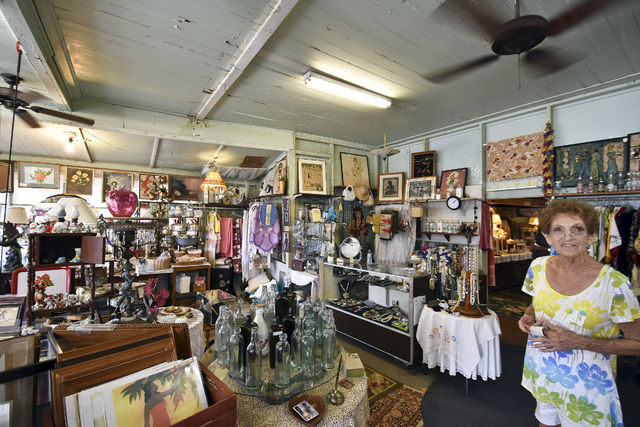Collectibles and Fine Junque shop survived Hurricane Iniki. It endured economic recessions. For more than three decades, it sold unique antiques that kept customers coming back for more. But a continuing battle against break-ins finally led its owner to decide,
Collectibles and Fine Junque shop survived Hurricane Iniki. It endured economic recessions. For more than three decades, it sold unique antiques that kept customers coming back for more.
But a continuing battle against break-ins finally led its owner to decide, it was time to move on.
“I have to force myself to close,” Doris Hanson said. “My sister-in-law is coming from Oahu so everything should be packed and ready to go.”
The Waimea store will be closing within the next two weeks, Hanson said Monday. And she’ll miss it.
“This is not like a job,” Hanson said. “It is so much fun. When new merchandise comes in, I get to take it home, clean and look at it. This is a sickness, and you’re not supposed to catch it.”
Housed in the Fah In building on Kaumualii Highway, the collectible and antique shop is hosting a storewide liquidation sale until doors close for good.
“I’m just waiting on the Salvation Army and the Kauai Habitat for Humanity so I won’t have to lift,” Hanson said. “Most of the furnishings are already sold and the new owners are just waiting for the material to clear off them before they come and pick up.”
Hanson has been operating Collectibles and Fine Junque for more than 30 years, once having two stores going at the same time.
“The first shop was located near Bucky’s Liquor, and when a girl came, we opened this shop on the highway. We had two shops selling merchandise, and when Hurricane Iniki destroyed the first shop, everything was moved to this shop,” she said.
Hanson said she survived Hurricane Iniki, but after going through several break-ins, which she did not want to speak too much about, had to come to a “fast decision.”
“The police have been here quite often,” she said. “The very first time several years ago, they took all my high-end jewelry like the sterling silver. On another break-in, they took the large glass balls. I was lucky because a man who lives on the waterfront found one, complete with my stickers, half submerged and brought it back. There have been others, but there’s no money in here, and I never replaced the high-end jewelry.”
The break-ins have been part of her life in the building which she considers to be historic.
“I haven’t read anything, or seen anything, but someone said the building was built in 1898,” Hanson said. “There is a stove back there with 1910 inscribed on it. But if you look at it, it’s so huge and there is no door, or any kind of opening big enough for it to come in, so they must have built the extension around the stove. When the sign was damaged, I made a mistake and added an extra ‘n.’ This building is supposed to be Fah In which is translated to mean ‘flower garden.’”
Already, items are going out the door.
She spoke with a bottle collector from Honolulu who was searching out the large size Waimea Dairy round bottles.
“The round bottles came before the square ones,” Hanson said, noticing how her supply had disappeared, a possible victim of her latest break-in that took place within the past two weeks.
There are pictures and posters, dolls and dishes, clothes and clocks remaining. All must go.
She said the umbrellas, which hang from the ceiling, serve to cover the ducts which connect to the large stove hoods.
“There’s one opening where the dust and things come in,” Hanson said. “I put the umbrellas there to catch it before it hits the store.”
Customers continue to flow through the former-restaurant where someone told Hanson they remember coming to eat with the family for four days for just $4.
When the doors to Fah In close in the next several days, Hanson said she hasn’t really set any retirement plans.
“I guess I’ll clean my house,” she said. “I want to paint the bathroom, but have no long term plans. One thing for sure, I want to stay busy. I didn’t pre-plan any of this. It is what it is.”




